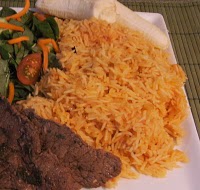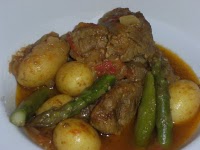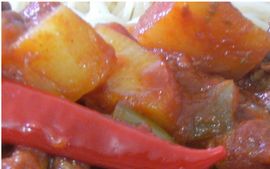Somalia Horn of Africa
Food

somalian rice.
Somali cuisine varies from region to region and consists of an exotic mixture of diverse culinary influences. It is the product of Somalia's rich tradition of trade and commerce. Despite the variety, there remains one thing that unites the various regional cuisines: all food is served halal.

beef with potatoes and asparagus.
. There are therefore no pork dishes, alcohol is not served, nothing that died on its own is eaten, and no blood is incorporated. Qado or lunch is often elaborate. Varieties of bariis (rice), the most popular probably being basmati, usually serve as the main dish. Spices like cumin, cardamom, cloves, cinnamon and sage are used to aromatize these different rice dishes.

spicy pasta sauce with beef and potato.
Somalis eat dinner as late as 9 pm. During Ramadan, dinner is often served after Tarawih prayers – sometimes as late as 11 pm. Xalwo or halva is a popular confection eaten during special occasions such as Eid celebrations or wedding receptions. It is made from sugar, cornstarch, cardamom powder, nutmeg powder and ghee. Peanuts are also sometimes added to enhance texture and flavor. After meals, homes are traditionally perfumed using frankincense (lubaan) or incense (cuunsi), which is prepared inside an incense burner referred to as a dabqaad.